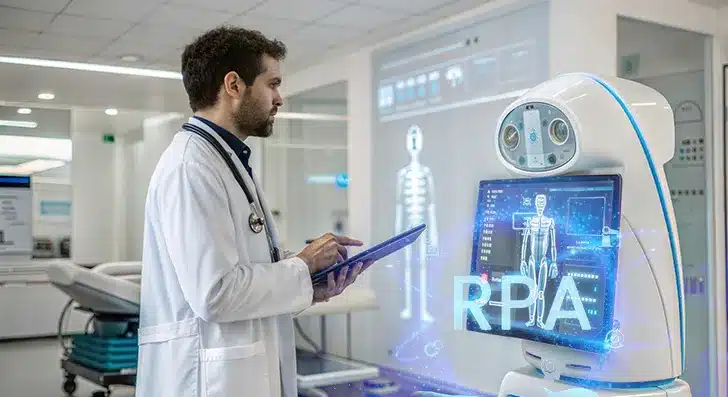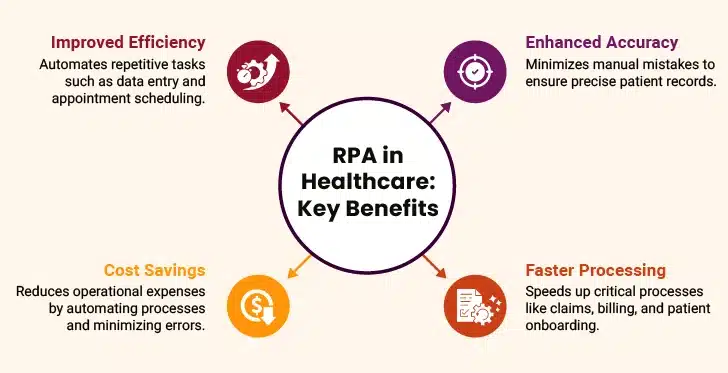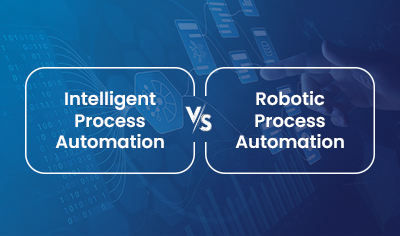The healthcare industry, while constantly innovating in patient care, often struggles with administrative tasks. A majority of these non-core but important functions, such as patient onboarding, appointment scheduling, medical billing, claims processing, prescription management, and so on, are performed manually. This adversely impacts the bottom-line and leads to higher healthcare operational costs.
Additionally, performing such ancillary operations manually implies a longer turnaround time needed to deliver optimal patient care, especially in the highly time-sensitive industry. Robotic process automation in healthcare, therefore, emerges as a blessing in overcoming such challenges and providing value-based care to patients. In this blog, we will explore the importance, use cases, and benefits of RPA in healthcare.

Table of Contents
RPA in Healthcare: Making the Paradigm Shift
Reimagining Healthcare: The Revolutionary Impact of RPA
Putting RPA to Work: Use Cases for Healthcare Transformation
Challenges of RPA in Healthcare
RPA in Healthcare: Making the Paradigm Shift
Healthcare institutions regularly collect and handle vast amounts of data. They get the data from a range of internal and external sources, including EHR applications, ERPs, claims management, scheduling software, third-party portals, clinical apps, and radiological information systems. All this information must be integrated seamlessly with the institutional workflows to ensure timely analysis of the reports so that value-based healthcare can be delivered to patients.
Beyond the administrative workload, there’s an increasing volume of patients, each seeking personalized care and communication. As a result, physicians are under constant pressure, juggling between an endless number of responsibilities. This leads to poor patient experiences, short staffing, overworked employees, and physician burnout. To better understand the magnitude of this issue, take a look at the following stats:
- A staggering 48% of physicians feel burned out regularly, working extra on an average of 15 hours per week in addition to their work hours.
- The high rate of physician burnout has direct and indirect costs associated with it, costing healthcare establishments an overwhelming $4.6 billion/year.
RPA in healthcare is transforming healthcare by offering substantial benefits to the industry. By mimicking human processes, RPA-powered software bots efficiently handle rule-based, repetitive, and high-volume tasks such as patient data entry and verification, appointment scheduling, follow-ups, claims processing, and report generation. This automation allows healthcare providers to focus on delivering optimal care rather than spending valuable hours on administrative tasks.
Make Your Business Workflows Smarter with RPA
Reimagining Healthcare: The Revolutionary Impact of RPA
Automation is transforming the healthcare industry by making the processes simpler, faster, and more accurate. It also eliminates organizational inefficiencies and reduces operational costs. Below are some of the key benefits of RPA in healthcare:
1. Personalization of Patient Care Delivery
Patients expect prompt responses, personalized services, and a hassle-free onboarding experience. Tasks that typically take a human representative more than 10-15 minutes to complete can be done by an RPA bot in 2-3 minutes. Thus, healthcare organizations looking to streamline their non-core but vital business processes and enhance their service delivery can offload repetitive tasks to RPA bots and reduce staff involvement in mundane activities. This allows them to focus on providing high-quality care and responding to patient needs in real time.
2. Strict Adherence to Regulatory Compliance
Healthcare is a heavily regulated industry with stringent compliance requirements, such as HIPAA. Bots can be deployed to track and audit sensitive patient data, ensuring regulatory adherence. Working on predefined rules, these bots ensure that each operation has all the relevant boxes checked. Healthcare process automation can also be used to comply with time-related regulations, for instance, if a lab test is completed within 24 hours of the clinic visit.
3. Augmented Healthcare Monitoring
Doctors often require real-time insights to prescribe the right medicines and initiate the treatment immediately, especially in sensitive situations like heart attacks or organ failure. RPA can be integrated across multiple systems to ensure a seamless flow of information and perform real-time analysis. This ease of data access facilitates better diagnosis and helps curate better pre- and post-discharge treatment. Whenever there’s any discrepancy or emergency, these software bots send alerts to patients or healthcare staff, ensuring timely intervention.
4. Physician Burnout Reduction and Prevention
The healthcare sector is often overwhelmed with resource-intensive and time-consuming tasks. Thanks to RPA, a majority of these rule-based tasks can be offloaded to bots, reducing staff involvement in monotonous tasks. This enhances the cognitive bandwidth of healthcare professionals and reduces burnout rates. Physicians can better focus on delivering high-quality care and services to patients rather than focusing on data handling and management tasks.
5. Cost Management
While implementing RPA in healthcare requires an initial investment, the return on investment (ROI) far outweighs the cost. Beyond streamlining processes and optimizing service delivery, RPA improves data accuracy, eliminates redundancies, and reduces human intervention, leading to significant cost savings. Furthermore, with RPA solutions in place, healthcare organizations can accelerate process cycle times and enhance patient care management.
6. Enhanced Data Interoperability
Patient information is typically stored across a variety of sources and in disparate formats, making data collection and processing challenging. However, integrating RPA with technologies like artificial intelligence, machine learning, OCR, etc., can help create an ecosystem that supports intelligent document processing. Resultingly, the data collection process becomes effortless, irrespective of the source or the format.

Putting RPA to Work: Use Cases for Healthcare Transformation
RPA for healthcare has various applications. From simple activities like generating automated email responses to facilitating single-click installation of complex systems, healthcare automation can do it all efficiently. Let’s take a look at some of the common RPA use cases in healthcare:
I. Appointment Scheduling
Managing and scheduling appointments is one of the non-core but important tasks that can be assigned to bots. By scanning information such as suspected diagnosis, doctor’s availability, location, time, etc., the bots can schedule appointments and send timely reminders to patients. It can also remove the slot if the patient cancels the appointment and notify the doctor.
II. Bill Settlement
One of the most cumbersome and tiring processes in the healthcare industry is bill settlement and claims processing. RPA can streamline the entire settlement process by combining different charges, such as doctor’s fees, medication, testing, and food, into a single, hassle-free payment. Consequently, healthcare providers can minimize billing errors and make the process more precise and convenient. Plus, RPA can also send personalized payment overdue reminders to patients.
III. Claims Processing
Regarding health claims, RPA can be leveraged to check the status of health insurance claims. For example, if a human rep takes 90 seconds to review the form, bots, on the other hand, can perform the same task in 15 seconds while ensuring compliance. Indeed, healthcare process automation is a cost-effective way to prevent financial losses due to administrative errors.
Stay Updated with RPA Trends in the Insurance Industry
IV. Post-Treatment Care
RPA can be used to deliver holistic post-discharge care. Bots can send reminders for medications, schedule follow-up appointments, follow strict meal plans, and share educational material. They can also encourage patients to keep a check on their blood sugar levels, pulse rate, blood pressure, etc. If the situation is concerning, the bots alert the patients immediately, thereby augmenting the overall patient experience.
V. Asset Tracking
There are times when medical equipment gets misplaced, leading to delays in service delivery and work inefficiency. Integrating RPA with IoT-powered digital sensors can help hospitals manage their inventory, locate devices quickly, and monitor equipment status. Additionally, the same tracking approach can be used to locate organs for transplantation, paving the way for seamless surgical procedures.
Challenges of RPA in Healthcare
Robotic process automation in healthcare has numerous benefits but also poses challenges. Healthcare providers must overcome these challenges to implement RPA successfully.
1. Integration with Existing Systems
Most clinics and hospitals still operate with legacy software. Integrating RPA for healthcare with old systems can be problematic and may involve extra IT assistance.
2. Initial Investment and Training
Although robotic process automation for healthcare saves costs in the long term, a high initial investment is required. Organizations also need to train employees to work with automation tools.
3. Data Security and Compliance
Since healthcare RPA bots work with sensitive patient data, they must adhere to regulations such as HIPAA. Any security vulnerability can cause data breaches and legal liabilities.
4. Scalability Issues
Certain RPA solutions are ideal for small applications but face issues in handling big datasets. Organizations must opt for tools that are scalable to match their demands.
The Future of RPA in the Healthcare Industry
The role of RPA in healthcare is growing at a fast pace. With technological advancements, automation will have an increasingly significant role in patient care and organizational efficiency.
I. AI-Powered Automation
Future RPA will incorporate artificial intelligence (AI) and machine learning (ML). This will enable bots to learn from previous choices and perform more sophisticated tasks.
II. Improved Patient Engagement
Automation will enhance patient interactions through real-time chatbots, automated reminders, and tailored treatment suggestions.
III. Predictive Analytics for Healthcare
Robotic process automation in the healthcare sector will enable hospitals to process patient data quickly. This will assist in the early detection of diseases and enhance treatment planning.
IV. Broader Adoption Across Healthcare Segments
More clinics, pharmacies, and labs will implement robotic process automation in healthcare to decrease costs, improve accuracy, and enhance service delivery.
RPA is designing the future of healthcare by streamlining processes into faster, more intelligent, and more efficient ones. The future of healthcare relies on adopting this transformation.
Final Thoughts
RPA is reshaping healthcare by improving efficiency and reducing administrative burdens. Providers who adopt this technology gain a competitive edge, enhancing patient care and operational workflows. As automation continues to evolve, investing in RPA is no longer optional but essential for future-ready healthcare. As such, the time is ripe for innovating the healthcare industry via RPA, and the providers must invest in this new-gen technology to reap the benefits.





